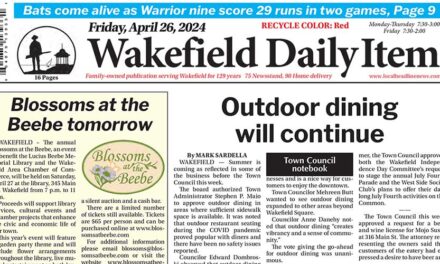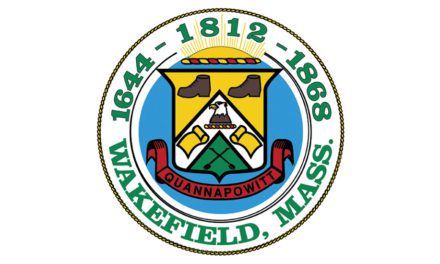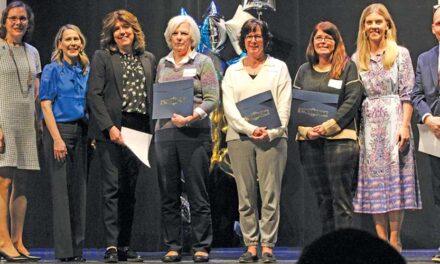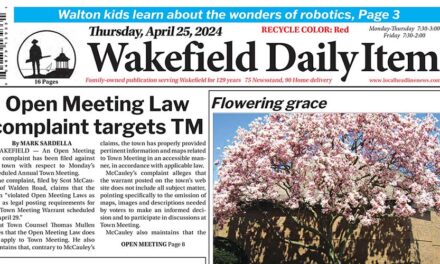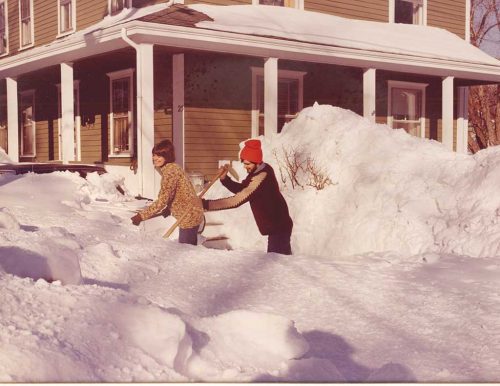
CAROL AND ALLEN LELAND dig out from under nearly 30 inches of snow at their Charles Street home following the Blizzard of 1978.
Published in the February 6, 2018 edition.
Following is the second part of our look back at the historic Blizzard of ‘78. The storm began 40 years ago today.
By ROBERT D. KEOHAN
The Item on Wednesday (Feb. 8, 1978) printed a long list of snowmobilers who aided either the Fire or Police Departments. Two firms on New Salem Street donated the use of snowmobiles, Ralph’s Sunoco providing three and Fahey’s Tire two.
Also listed were those with four wheel drive vehicles who aided during the storm, those who helped with the Red Cross truck, men who were volunteers inside the police station, and those who lent toboggans to be medically equipped.
One change that was obvious was that the DPW could not collect rubbish all week and would resume on Monday, February 13.
(Gov. Michael) Dukakis, on TV at 9 p.m. Tuesday, announced that the State of Emergency would continue on Wednesday, again urging all except those in storm related work to “remain at home,” and that all cars but emergency vehicles stay off the roads.
On Wednesday morning an announcement was made that Boston was closed with no one from the suburbs to enter and no one from the city to go to the suburbs.
Hospitals went to TV during the height of the storm, giving out telephone numbers so ill or injured people could get help from physicians by phone since they could not be brought to the hospital.
Even with the storm winding down by 9 o’clock Tuesday evening, Dukakis announced that the various bans were still on for Wednesday and asked people to cooperate by staying home with the only people driving being those who were essential to storm related work. This was necessary because, as the governor said that night, “the clean up is going to be tough and we need all the cooperation we can get.”
In 1978 Ash Wednesday was on February 8. In view of the situation, Humberto Cardinal Mederios announced Tuesday that fasting would not be required in the archdiocese on the normal day but that Catholics could substitute another day later of their own choosing to fast.
Rev. William D. Coughlin let the Item know that the 5:30 Mass for St. Joseph’s parishioners would be in the hall on Murray Street (this was during the time after a fire destroyed the 19th century St. Joseph’s and before the modern church was erected, the period when the town allowed the Junior High School Auditorium to be used for parish masses). Fr. Coughlin for years has been pastor of Most Blessed Sacrament Church in Greenwood, which also serves Melrose Highlands.
While there were no fires locally during the storm the Wakefield Fire Department was hit by a heavy load of calls for medical assistance and enlisted the aid of snowmobilers and even a medically equipped toboggan to reach stricken residents.
On Wednesday Fire Chief Maloney asked residents to shovel out fire hydrants in case of emergencies. Another request was to shovel out front doors in case of an emergency so that aid could get into a house.
During the storm the Fire Department manned both the Central and Greenwood stations with double shifts and with enough men to even man the reserve ladder truck in Greenwood. Whenever medical calls came in, the DPW sent a vehicle to the scene in case snow had to be moved.
For a maternity case on Robert Street a Cardillo, Inc., truck led the way by plowing so that the police and fire could get there via Forest and Meriam Streets.
Police stations, hotels and motels, schools since they were shut for the week, hospitals and 62 state armories were all pressed into service to take in the stranded and to provide warmth, sleeping accommodations and food.
The appeal by Governor Dukakis was “hand carried” to the White House to ask President Jimmy Carter to declare the Bay State a “federal disaster area” which was done, along with Rhode Island.
Boston Mayor Kevin White was in Washington to get the Congressional delegation to ask for the delegation’s aid. Both US Senators, Democrat Edward M. (Ted) Kennedy and Republican Edward W. Brooke made similar statements following the designation of the state as did Wakefield’s congressman, Edward J. Markey of Malden, now a U.S. senator.
With federal aid now lined up, the snow first had to be cleared from Logan Airport, which had closed at 5 p.m. Monday. One single runway had to be cleared of snow. Rhode Island was designated as a “disaster area” first and eventually Connecticut also was. The Bay State was to receive 300 to 400 men from the First Army and 350 pieces of heavy equipment, including bulldozers and front end loaders. One runway at Bradbury Airport at Winsor Locks, Connecticut, also was being prepared for an airlift from First Army.
Sections of the Back Bay, the Prudential District, and some western suburbs sustained serious power outages. Some 75,000 Boston Edison households went out at 3 a.m. but by 1:30 p.m. the number out was down to 20,000 and by 2 p.m. had dropped to 10,000, with 3000 Framingham, Waltham and Weston residents and users still out.
While all non-essential workers were urged “to stay home,” off-day gas, electric and telephone workers were told to check with their supervisors as to whether or not their services were needed.
One bit of good news in Wednesday’s Item was the announcement from William R. Spaulding, president of the Wakefield Savings Bank, that it had the best January gain ever with an increase in deposits of $1,058,405.
The retrospective continues tomorrow.

